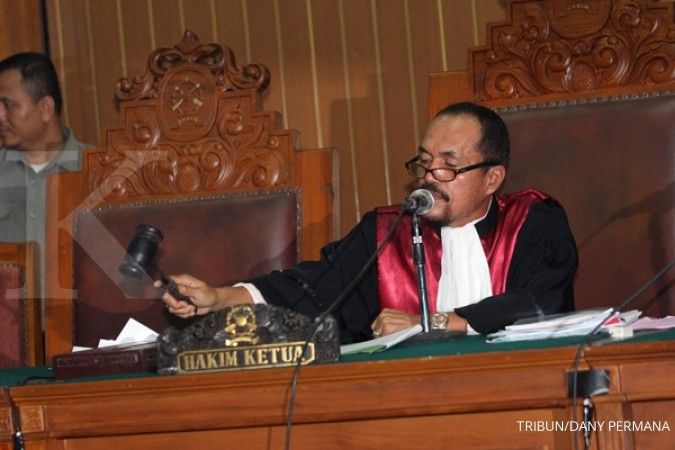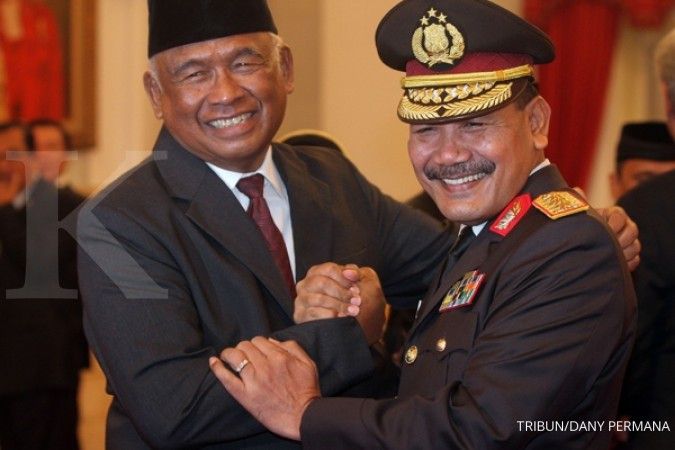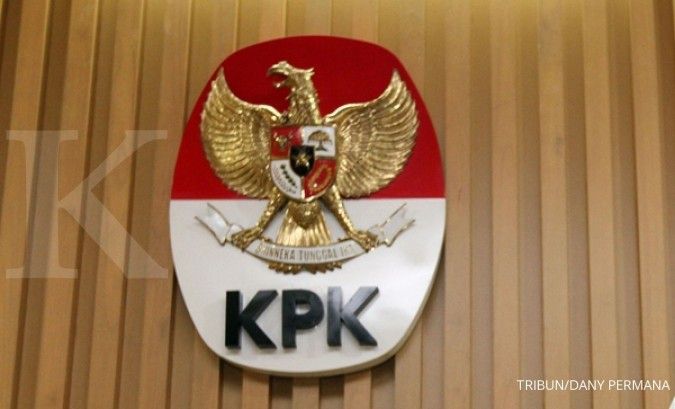JAKARTA. Doubts have mounted over the Corruption Eradication Commission’s (KPK) future commitment to pursuing high-profile cases following a plan to assign new police investigators to assist the antigraft body at the request of its new leadership.
Antigraft campaigners have voiced pessimism over the future of high-profile graft probes under the leadership of acting chairman Taufiqurrahman Ruki and acting deputy chairman Indriyanto Seno Adji because of perceived potential conflicts of interest in a number of cases being investigated by the KPK.
National Police Criminal Investigation Directorate (Bareskrim) director Comr. Gen. Budi Waseso said on Sunday that his office was preparing 50 of its investigators to be immediately deployed to help the KPK, a move Budi cited as evidence of a truce between the two institutions after weeks of battles.
“The KPK is asking for an additional 50 investigators from the National Police. We have agreed. Is this a form of weakening the KPK? I don’t think so,” he said.
But activists fear that the appointment of the two acting leaders will hamper certain cases, including the ongoing investigation into the Bank Indonesia liquidity support (BLBI) case that could implicate President Joko “Jokowi’” Widodo’s patron Megawati Soekarnoputri, as well as the Bank Century scandal implicating former vice president Boediono.
The planned deployment comes after the police named 21 KPK investigators suspects for illegal firearm possession.
Ade Irawan of Indonesia Corruption Watch (ICW) lambasted Taufiqurrahman who he said, might have a conflict of interest in the current investigation into alleged corruption at publicly listed Bank Jabar Banten (BJB), in which the acting KPK chairman currently serves as a commissioner. Ade argued Taufiqurrahman was wrong to ask the National Police to supply 50 more investigators to the antigraft body just hours after being sworn in on Friday.
“Why did he on his first day in office ask for more investigators from the police without even studying the internal situation at the KPK after the KPK-police standoff? Yes, the KPK needs more investigators, but such a decision should be made collectively with other commissioners,” Ade said on Sunday.
Taufiqurrahman, Indriyanto and former KPK deputy for prevention Johan Budi are the new acting leaders that Jokowi has chosen following the suspension of two former leaders, Abraham Samad and Bambang Widjojanto, after the police named the pair suspects in separate cases.
The police investigation into Abraham and Bambang came after the KPK named National Police Institute (Lemdikpol) head Comr. Gen. Budi Gunawan a suspect in a bribery case.
Ade added that the influx of police investigators at the antigraft body would influence the handling of graft cases, including the investigation into Budi, whose nomination as police chief led the KPK to announce his suspect status.
Foundation of the Indonesian Legal Aid Institute (YLBHI) director Bahrain also questioned Jokowi’s decision to appoint the two acting leaders, especially Indriyanto, who, he said, had worked as a lawyer in the Bank Century scandal and the BLBI case.
“The question is who whispered to the President to recommend them as acting KPK leaders because there are many other figures who have clean track records who could replace Abraham and Bambang. Another concern is who the acting commissioners work for,” Bahrain said.
Bahrain also criticized Taufiqurrahman for suggesting that the KPK might hand over Budi’s case to the graft-ridden AGO, warning that such a move could mean the end of the investigation, given the AGO’s notorious habit of shutting down high-profile graft cases.
Meanwhile, former KPK commissioner Bambang Widjojanto encouraged his successors to free themselves from any vested interests to allow them to carry out the job.
“I was once a lawyer and it was used to continuously bully me and impose injustice upon me,” Bambang said during a rally to promote support for the KPK on Sunday.
He also called for cooperation with other law enforcers and a comprehensive plan to endorse accountability and transparency within the KPK. (Haeril Halim and Margareth S. Aritonang)
New police detectives may hamper KPK investigation
February 23, 2015, 11.14 AM
/2015/02/20/2122517109.jpg)
ILUSTRASI. Wapres Ma'ruf Amin hadiri Pencatatan Perdana Efek Beragun Aset Syariah berbentuk Surat Partisipasi (EBAS SP) milik PT Bank Syariah Indonesia Tbk (BRIS) dan SMF
Source: The Jakarta Post
| Editor: Hendra Gunawan
Latest News
-
February 25, 2026, 08.28 PM
Inpex to Solicit Bids for Construction of Indonesia's Abadi LNG Project in Mid-2026
-
February 24, 2026, 03.38 PM
Eni to Reach Final Investment Decision for Indonesia Gas Projects Next Month
-
February 24, 2026, 01.00 PM
Asia Stocks Try to Steady after Wall Street Selloff Sims Mood
-
February 23, 2026, 04.50 PM
Wall Street Futures and Dollar Slide on Trump Tariff Tumult
-
February 23, 2026, 02.17 PM
Indonesia's Government Spending Jumps 26% in January 2026
-
February 23, 2026, 01.47 PM
Indonesia's Government Spending Jumps 26% in January
-
February 21, 2026, 06.00 AM
Indonesia's Pertamina to Maintain Bidding Process for US Energy Imports
-
February 20, 2026, 01.23 PM
Indonesia Secures 19% Tariff Deal with US, Palm Oil and Other Commodities Exempt
-
February 20, 2026, 08.33 AM
Indonesia, US Sign Agreement on Reciprocal Trade, Indonesian Ministry Says












